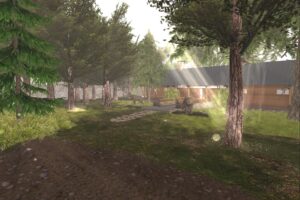September 16, 1713 is widely regarded as the unofficial beginning of Fox Hollow, North Carolina.
A group of settlers, led by Elias Brown, decided to move inland to avoid the turbulent storms that they suspected would batter the coast in the future. They followed the rivers inland until they found themselves far enough inland and into the mountains that they felt safe from most hurricane damage. They settled an hour outside what would eventually be known as Asheville, North Carolina. Bountiful raccoon and fox populations supplemented the lumber stocks to the east, leading early settlers to argue over a town name of Fox Hollow or Raccoon City. The name Fox Hollow won out by only five votes, with at least three residents reported to have stormed out of the town hall meeting in anger.
Word of the prosperous town soon spread, both to the oceanfront settlements of the east full of immigrants looking to start a new life and further west to several mining communities who eyed the region’s mountains for potential iron, silver, and gold deposits. Despite its advantageous location during the Revolutionary War, Fox Hollow avoided much of the conflict and hardship that faced most of the coast. Its relatively remote location prevented much of the looting and supply-hoarding that struck other towns and cities in what would become North Carolina.
After the war ended and North Carolina was formally founded as a state, Fox Hollow truly began to grow as a town. Fox Hollow was officially incorporated as a town on Wednesday, April 11, 1804. Merchant trade soon gave way to mining and logging, bringing the town to be a quiet, and peaceful little town for those who worked both trades. Shortly after, Fox Hollow became home to numerous mansions belonging to the area’s many prosperous business people and the rich socialites of New York and Detroit looking for summer vacation homes.
In July of 1814, Fox Hollow formally became part of Jasper County. Local leaders were looking to consolidate power and define clear laws for the area’s farms, businesses, and residences. The county’s namesake was Sergeant William Jasper, a Revolutionary War soldier who distinguished himself in the defense of Fort Moultrie and at the Siege of Savannah. Sergeant Jasper was shot by British troops while attempting to fasten the colors of the 2nd South Carolina Regiment to battle ramparts, but, even while fatally injured, he did not drop his regiment’s flag and held them to safety until he died.
Fox Hollow was the scene of more than one infantry battle during the Civil War, but they were spared much of the shelling and destruction that plagued most of the mid and southern states. Post-civil war, industry kicked back into high gear in a nearby town, and townsfolk began pouring into Fox Hollow once again.
The 1970s and 1980s saw the decline of manufacturing in the United States, and Fox Hollow suffered as a result. This left the town quiet small in population once again, and struggling to keep itself afloat. Blighted buildings were condemned and sold for pennies on the dollar, resulting in quick renovations or complete demolitions and reconstruction. Residents who were displaced by this plan were compensated fairly, preventing the issues that fractured cities like Cleveland and Detroit.
Today, Jasper County still prospers. Fox Hollow is one of the nation’s top destinations for those who love the outdoors and people who want a quiet place to start a family, and it was named the third best place in the state to start a small business.






